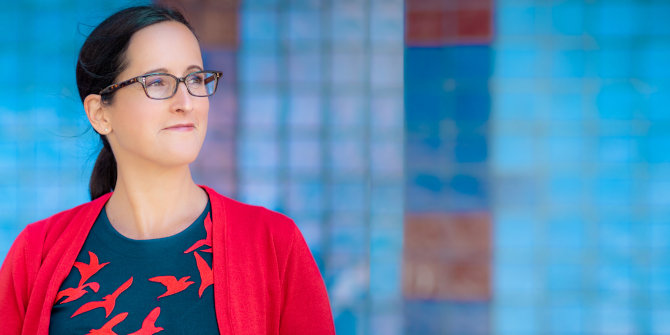 Turkey will hold its first ever direct presidential election on 10 August. Cengiz Gunes writes on the role of the country’s Kurdish minority in the vote. He argues that while Turkey’s Prime Minister Recep Tayyip Erdoğan is a strong favourite to win the election, with the pro-Kurdish candidate Selahattin Demirtaş only likely to claim third place, the Kurdish support base could be crucial if the election goes to a second round of voting. This could allow the Kurdish population to leverage their influence over Erdoğan‘s government and potentially gain political concessions.
Turkey will hold its first ever direct presidential election on 10 August. Cengiz Gunes writes on the role of the country’s Kurdish minority in the vote. He argues that while Turkey’s Prime Minister Recep Tayyip Erdoğan is a strong favourite to win the election, with the pro-Kurdish candidate Selahattin Demirtaş only likely to claim third place, the Kurdish support base could be crucial if the election goes to a second round of voting. This could allow the Kurdish population to leverage their influence over Erdoğan‘s government and potentially gain political concessions.
The prospect of the first direct presidential election in Turkey’s history – and the candidacy of pro-Kurdish Selahattin Demirtaş has generated much excitement among the country’s Kurds. Though Demirtaş is not in the running to win the election, his party has the chance to play an important role in the elections. Plus, he has fought an effective campaign and brought broader support to the pro-Kurdish party from outside the minority.

The election is taking place in an environment of relative calm in Turkey’s majority Kurdish regions in the east and south-east of the country. This is welcomed by all sections of Kurdish society because, for much of the past 30 years, the region has been engulfed in violence caused by the conflict between the guerrillas of the Kurdistan Workers’ Party (PKK) and the state security forces. Since November 2012, dialogue between the PKK and the Turkish state has been taking place, which resulted in a declaration of a ceasefire in March 2013.
So far the ceasefire has held – and there appears to be some progress; the continuing dialogue has fueled optimism among the Kurds that this protracted conflict may finally be settled peacefully. The Kurdish expectation is that following the presidential election, more concrete steps will be taken to end the insurgency and address the Kurds’ popular demands such as education in the Kurdish language and self-rule.
Kurds used to authoritarianism
The Kurds’ optimism of a better future is not shared in other parts of Turkey, however. The government’s intolerance of opposition and popular forms of protest – which the Kurds know very well – has become apparent to the citizens in western Turkey, especially in the past year. It began in June 2013 when police used excessive force to suppress the peaceful Gezi Park protests leading to widespread civil unrest in the country. This was followed, in December 2013, by protests following the corruption scandal that implicated Erdoğan’s family members and inner political circle. Then the death of 301 miners on May 13 this year brought about a new wave of anti-government protests.
Anti-democratic practices that severely restrict the right to protest in Turkey indicate the arrival of a new brand of Turkish authoritarianism under Erdoğan’s rule. The curtailment of press freedom, including the ban on social media sites such as YouTube and Twitter in March 2014 show the lengths to which Erdoğan is capable of going in order to suppress popular protest. Despite the government’s anti-democratic practices and its apparent authoritarianism, Turkey’s main opposition parties have been unable to galvanise an anti-Erdoğan alliance and the governing party has maintained its support in the last local elections held on March 30 2014.
Electoral hopes
The opinion polls put Demirtaş – the pro-Kurdish candidate – in third position, with between 7.5 per cent and 9 per cent of the vote. This figure marks an improvement in the share of the votes that the pro-Kurdish Peace and Democracy Party and the Peoples’ Democratic Party got in the last local elections, but any result below 10 per cent will be seen as a disappointment by the pro-Kurdish camp. This is indicative of how far they’ve come in broadening their support and the quality of their campaign.
Demirtaş’s increasing popularity among a wider section of the electorate, especially women and the Alevi religious minority, raises the Kurds’ hopes that the pro-democracy and pro-peace radical democratic alliance they have been carefully constructing during the past two decades is finally becoming a genuine political alternative in Turkey. And, beyond the election results, the Kurds feel that having their own candidate gives them the opportunity to communicate their demands to a wider section of Turkish society. Through this alliance they can share their vision of a peaceful and democratic-pluralist Turkey that they aspire to build.
Tipping the balance
If Erdoğan doesn’t win outright in the first round of voting and the election goes into a second round, the importance of the Kurdish vote for the other candidates is immense. In the event of a run-off, Demirtaş’s 7.5-9 per cent will then prove pivotal to deciding the election’s outcome. And there is much speculation about who the Kurds might support and on what conditions.
So far, Ekmeleddin İhsanoglu (the second most popular candidate) has done little to win the Kurds’ support. Given that he has the support of Turkey’s two main extremist, nationalist parties – the Nationalist Movement Party (MHP) and the Great Union Party (BBP) – who reject any move to recognise Kurdish rights, he is badly positioned to gain support from Turkey’s Kurdish community. That leaves Erdoğan as the only other candidate trying to win the support of the Kurds.
For the Kurds, a commitment to peacefully resolving the conflict will be a major step for consolidating democracy in Turkey. The election for them is a rare opportunity to exert pressure on the government to address their group specific political demands and strengthen Turkey’s democracy for all.![]()
Please read our comments policy before commenting.
Note: This article was originally published on The Conversation. Read the original article. The article gives the views of the author, and not the position of EUROPP – European Politics and Policy, nor of the London School of Economics.
Shortened URL for this post: http://bit.ly/1mvhnl6
_________________________________
 Cengiz Gunes – Open University
Cengiz Gunes – Open University
Cengiz Gunes is an Associate Lecturer at the Faculty of Social Science at The Open University. He is the author of The Kurdish National Movement in Turkey: From Protest to Resistance (Routledge, 2012) and co-editor of The Kurdish Question in Turkey: New Perspectives on Violence, Representation, and Reconciliation (Routledge, 2014).




